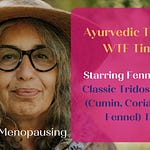Hi
Last week you received a bunch of emails about these live salons, forgive me, I’m still learning. I know you signed up for one email a week and occasional emails about classes and other offerings. I’ve finally figured out how to do some sectioning off of these emails. Every Sunday 🤞🏼I’ll be sending out a regular newsletter. And I’ve begun a collaboration with
which airs on Thursdays (for now) with show notes and recordings will come to your inbox. If you are not interested the recordings then there is an option to opt out of them. If you are interested, I hope you find these discussions as fascinating as I do.I’m about to go down a rabbit hole to discover how the chinese organ system correlations to the ayurvedic doṣha, dhātu and perhaps some other systems. 1
Show Notes:2
As we transition into summer, understanding how seasonal changes impact our bodies, especially during perimenopause, can be incredibly enlightening and beneficial.
In episode 03 of Art and Heart of Menopause Salons, Chitra Eder and Clarissa Kristjansson explored the seasonal transitions through the lens of Ayurveda and Chinese Medicine with insights and suggestions for navigating the shift from spring to summer.
Introduction to Seasonal Changes
The conversation began with Chitra Eder highlighting the importance of acknowledging seasonal changes. Many of us are so engrossed in our daily lives and disconnected from nature that we often overlook the subtle shifts in our environment. With climate change making seasons more unpredictable, the challenge to adapt has never been greater. Both Chitra and Clarissa compare this unpredictability to perimenopause, where symptoms are irregular, making it difficult to know how to respond.
Have you considered the affect of seasonal changes on your menopausal symptoms?
Ayurveda and Its Perspective
Chitra provided an insight into Ayurveda, a traditional Indian system of medicine. She explained how Ayurveda views menopause as a natural transition, focusing on rejuvenating the body as women move from a stage dominated by fire (pitta) to one dominated by air (vāta). This requires balancing the body's elements and recognizing the interconnectedness of various systems within the body.
Chinese Medicine Insights
Clarissa brought the perspective from Chinese Medicine, which also acknowledges menopause as a natural life transition. The emphasis in Chinese Medicine is on balance, particularly between yin and yang elements within the body. The summer season, being naturally yang with its hot, dry qualities, poses unique challenges when many women in perimenopause are already yang or yin deficient.
Managing Seasons in Perimenopause
Importance of Diet and Dietary Adjustments:
During spring, as temperatures rise and the body begins to melt the winter's accumulations, eating easy-to-digest foods is crucial. Ayurveda suggests bitter and astringent foods, while Chinese Medicine recommends introducing cooling but not cold foods, focusing on maintaining a warm digestive system.
Movement and Lifestyle: Simple activities, such as walking and stretching, are advocated in Ayurveda to aid digestion and promote balance. Clarissa discussed how Qigong, a pillar of Chinese Medicine, uses the five-element theory to optimize the balance of organ systems through movement and visualization. Both disciplines recommend avoiding extreme practices like cold plunges that might disrupt internal balance.
The Role of Environment
We also touched on the importance of maintaining a harmonious environment, both internally and externally. While we can't control macro-level climate changes, we can focus on our immediate surroundings to create conducive conditions for health and well-being.
Community and Support
A significant part of both Ayurveda and Chinese Medicine is the emphasis on community and emotional well-being. Having a support network is crucial as women navigate these personal and environmental transitions. Both are actively involved in creating spaces and opportunities for women to connect and support one another through these life stages.
Conclusion
Transitioning from spring to summer can be a challenging time, particularly during perimenopause. However, by incorporating principles from Ayurveda and Chinese Medicine, women can better navigate these changes.
Focusing on balanced nutrition, gentle movement, and harmonious living environments, while fostering community support, can greatly enhance quality of life during these seasons of change.
By embracing and adapting the wisdom of these ancient practices, we can find new ways to thrive amidst life's transitions.
00:00 Introduction to Summer and Perimenopause
02:07 Meet: Chitra and Clarissa
04:04 Understanding Ayurveda and Menopause
07:30 Chinese Medicine and Qigong Explained
13:09 The Interplay of Seasons and Health
27:40 Navigating Perimenopause in Spring and Summer
45:06 Understanding Digestive Irregularities
45:46 The Importance of Warm Foods in Chinese Medicine
47:09 Qigong and Meditation Practices
47:37 Engaging with the Audience
48:46 Women's Health and Menopause
51:06 Seasonal Dietary Adjustments
52:36 Exercise and Movement in Ayurveda
56:47 Balancing the Elements through Movement
01:00:41 Adapting Ancient Practices to Modern Life
01:04:45 Managing Menopausal Symptoms
01:11:12 Final Thoughts and Farewell
If you’d like to catch next week’s Salon, we will be comparing the Ayurvedic Doṣha Clock to the Chinese Daily Organ System Clock.
Here’s the link to add it to your calendar. Art and Heart of Menopause Live Stream
Written by Human - Chitra
Video Edited to remove extra noise and transcribed by AI. Show notes written by AI and edited by Chitra - Human with my furry helpers

















Share this post